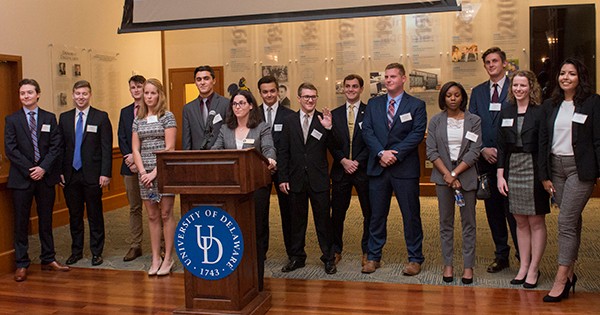Editor note: This article, written by Sharon Abrams, human resource manager at the Commonwealth Trust Company, originally appeared in the May/June 2021 issue of the Delaware State Chamber of Commerce’s Delaware Business magazine. It is reprinted with permission.
As more baby boomers retire every day, we lose their business and institutional knowledge. Much of corporate America has not accomplished adequate knowledge-transfer processes, which result in rushed and painful training and retraining of vacated positions. Factored together, employers struggle with succession planning, career pathing, and
on-the-job training. We find ourselves in a knowledge and skills gap with no pipeline of talent to fill open positions.
The question posed is, “How do we build a supply of talent to fill the demand of entry- and mid-level positions quickly?” Below are two forwardlooking initiatives that help bridge these gaps for specific positions.
University of Delaware
The University of Delaware offers the first and only accredited trust management minor in the United States. Students build a foundation of skills in trust law, tax, investments, and business through traditional coursework and completing a summer internship in the trust industry. The program was first imagined by a team of trust professionals led by Cynthia
Brown, president of Commonwealth Trust Company, while she was wrestling with recruitment, training, and retention of trust administrators. The group came up with a regional initiative concept and developed it with the Delaware Bankers Association, a consortium of well-respected members of the Delaware trust industry, in conjunction with the Delaware Economic Development Office and University of Delaware. This collaborative effort created a program that defines success for both students and participating companies. The program is run by Jennifer Zelvin McCloskey, JD LLM, who advises, coaches, and helps place these students with companies in the trust industry.
Quite often, the student continues to intern for more than the required 120 hours and is offered a regular, full-time position as a trust administrator upon graduation. The internship provides experience to the student, which enables them to start a position above entry-level. It also benefits the trust companies in that they make a hire that understands its products and
services to their clients.
The trust industry and the University formed an advisory board to the minor as a means of ensuring that the students’ focus continues to be aligned with the needs of industry.
Year Up
Year Up is a national 501(c)3 workforce development organization committed to ensuring equitable access to economic opportunity, education, and justice for all young adults—no matter their background, income, or zip code. Employers face a growing need for talent while millions of talented young adults lack access to meaningful careers. These inequities only further perpetuate the opportunity gap that exists in our country—a gap that Year Up is determined and positioned to close. Year Up’s intensive training program utilizes a high expectation, high support model where students learn in-demand, technical and professional skills and apply them during a corporate internship. Students are matched with internships in roles that companies are trying to fill. Last year, 87% of graduates in the Philadelphia/Wilmington area became gainfully employed, enrolled in college, or both within four months of graduating
the program.
Year Up also partners with local businesses to participate by teaching, judging and coaching student elevator speeches, interview skills and resume preparation. Wilmington’s banking industry, in particular, offers six-month corporate internships to help students get their foot in the door, network, and receive further hands-on training. To ensure the correct skills are being developed, Year Up conducts community scans to determine employers’ needs. Training programs are developed based on those demands and industry trends.
Students might ask, “What’s in it for me?” An educational stipend to offset expenses during training as well as the internship is offered to program participants. One of the more valuable professional skills gained are the soft skills, which set these students apart to hiring managers.
The graduates are adaptable, comfortable with business communication, anticipate and solve problems, and readily accept feedback. Once a graduate of Year Up, students belong to a supportive network of over 20,000 alumni for mentoring, job leads, or just a listening ear.
Often, after their internship, participants are offered regular, full-time employment with benefits. Many times, those benefits include tuition reimbursement that allow many to continue with their higher education, especially since they can earn up to 30 ACE college credits for their 12months at Year Up.
Sector-based regional initiatives such as these need planning and commitment to yield the phenomenal payoff for both businesses and the community. Yet they are proven ways to close the knowledge and skills gaps. They play a significant contribution to building Delaware’s talent pipeline for today and tomorrow.




